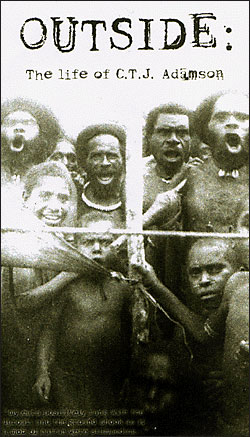Outside The Life of C.T.J. ‘Bill’ Adamson
Charles Thomas Johnston (‘Bill’) Adamson was born on 17 January 1901, between
the proclamation of Australian Federation on 1 January and the first federal election in March. His
father was an Australian surgeon living in England and his mother was from the Scottish aristocracy.
Despite an excellent public-school education, Bill turned away from privilege. After learning the wool
trade, he emigrated to Australia in 1923 to work with a shearing team. He spent the next few years doing
the rounds of the sheds in Queensland. The year 1926 was a bad one on the land and after a period
cutting cane in far north Queensland, Adamson left for Papua (an Australian Territory since 1906) to
try his luck on the goldfields.
He prospected with variable success for the next decade, often the only European, many days
from assistance in precipitous terrain. In 1935 he joined the Papuan Government service as one of
Sir Hubert Murray’s ‘Outside Men’, and achieved a measure of fame for his part in the epic eight
month – and completely bloodless – Bamu-Purari Patrol into the Southern Highlands. This was
the longest exploration in Papuan history. He then helped to open the Lake Kutubu Patrol Post
in the Southern Highlands, where he spent two continuous years involved in the business of ‘first
contact’ on a daily basis. At the beginning of World War II, Bill joined the RAN and served first
on minesweepers in the English Channel and Western Approaches, then a corvette in the Indian
Ocean. After Japan entered the war, Bill returned to Papua, where he served as beachmaster at Oro
Bay, and in command of a survey ship assisting the Allied offensive in New Guinea. In the final year
of the war he assumed command of HMAS Taipan, one of the ‘cloak and dagger’ snake-boats of the
Services Reconnaissance Department. After demobilisation he returned to Papua in the government
service, and later as a plantation owner, before retiring to Cooktown in 1964. His health began to
fail, and in 1978, shortly after he was married, he shot himself.
Bill was well-educated and imbued with the ‘stiff upper lip’ values of the British Empire at the
turn of the last century. He believed in judging a person by their actions rather than their words.
He was a big man who valued sporting prowess, physical fitness and the capacity for hard work. He
played the mandolin and practiced yoga on his verandah.
When prospecting and patrolling in the Papuan bush, Bill carried a load along with his carriers,and
suffered incredible privations as a matter of course. He was awkward in company but greatly
respected by his peers. Although he partly subscribed to the prevailing notion of innate European
superiority over the ‘natives’, he lived for months at a time with no European companions and
established a deep rapport with indigenous labourers in his employ. Bill was the second best of the
prewar ‘Outside Men’ of the Murray administration of Papua, after Ivan Champion. He did not kill
anyone ‘Outside’, although he did try. In many ways he was nobody in particular, yet a fish, a bird and
a grass bear his name. His name resonates as one of the greats of Papuan exploration between the
wars, but he never courted publicity and was an intensely private person.
The diaries he wrote during his life provide an exceptional window into experiences and
attitudes shared by many Australian men of the Federation generation, and which continue to
shape contemporary Australian attitudes: drought, depression, itinerant jobs, the lure of gold and
exploration, privation, war, relationships, mateship, reverence of Anzac Day and a cold beer. Bill
was an astute observer at many scales, from observations of his fellows and circumstances on a daily
basis, to opinions of world affairs. He commented on events from the declaration of World War II
to the sacking of Whitlam. His biography tells the story, not of a major public figure or institution,
but of an ordinary man, born with Australian Federation.
|
|

AUTHOR:
Michael Bird
STATUS:
Back List
PRICE:
$49.95
ILLUSTRATIONS:
Approx. 150 black-and-whitephotographs
FORMAT:
Portrait; hardcover; c. 400 pages
DIMENSIONS:
234 x 153 mm
ISBN:
1863332162
|
|

